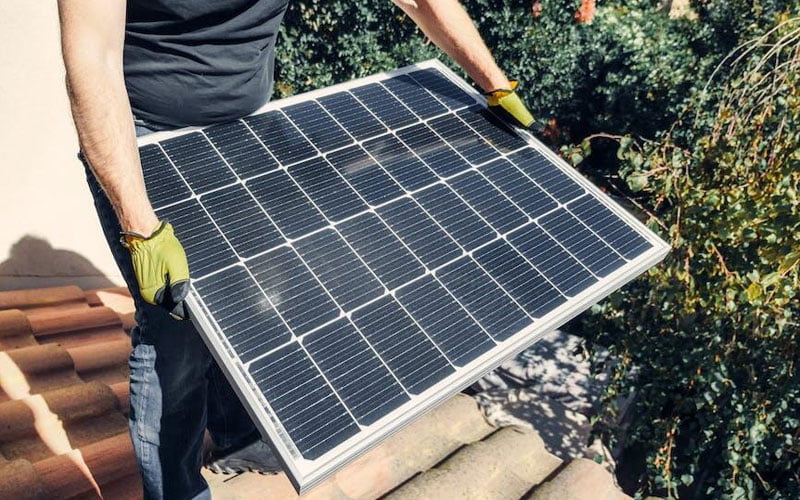Sun-drenched days could soon translate into moonlit savings. Imagine converting the sun’s rays into cold, hard cash! That’s the magic of solar panels.
Solar energy, a gift from our celestial sphere, can power your home, shrink your utility bill, and even fatten your wallet. But before you embark on your solar journey, here’s a rundown of the essentials you need to consider.
Just like the sun itself, these panels are blazing with brilliance, but they also have their own set of shadows. Consider this your map to navigate solar panel purchases before you power up your home.
Let’s get into it!
Understanding Your Energy Consumption
It is essential to review your utility bills to get a handle on how much electricity you use each month. Your consumption will fluctuate throughout the year, with spikes in the cooler and warmer months due to heating and cooling systems.
It’s crucial to be aware of your peak consumption, as your solar system needs to generate sufficient power to cover these periods. This data will also help your provider design a system tailored to your specific needs.
Knowing your energy consumption is the starting point to translate sunny days into significant savings.
Assessing Your Home’s Solar Potential
Not all homes are created equal when it comes to solar potential. Several factors can influence how much sun your home gets. You need to take into account:
- your geographical location
- the orientation of your home
- the size and pitch of your roof
- potential shading from nearby buildings or vegetation
A home in a sunny region, with a large, south-facing roof, minimal shading, and a suitable pitch for mounting panels, will generally see the highest solar output. On the other hand, a north-facing roof in a heavily shaded area may not be ideal for a solar installation.
It’s also worth considering the age and condition of your roof. If it’s likely to need replacement shortly, you may want to tackle that before installing solar panels.
To get an initial assessment, you can use online tools like Google’s Project Sunroof. However, it’s always best to get a professional evaluation to fully understand your property’s suitability for solar power.
Exploring Different Types of Solar Panels
There are many kinds of solar panels available. Monocrystalline panels are made from a single crystal structure. They give the highest efficiency rates since they are made out of the highest-grade silicon.
Polycrystalline panels have a unique look due to their manufacturing process. The silicon fragments melted together can create an effect that looks somewhat like a jigsaw puzzle. This process uses less energy, making them cheaper but less efficient than monocrystalline.
On the other hand, thin-film panels are the least expensive type. They are also flexible, which opens up many new potential applications. However, they also take up a lot more space and aren’t as efficient.
Keep in mind that each type has its pros and cons, so you need to consider your specific needs and conditions before buying solar panels.
Calculating the Cost and Payback Period
The total cost of your system will depend on its size and type, and any additional costs such as installation and permits. To calculate the payback period, you need to divide the total cost of the system by the annual financial benefits.
For example, if your system costs $15,000 and you save approximately $1,500 each year, your payback period would be 10 years. This is a simplified calculation and doesn’t factor in potential increases in energy costs over time, which could shorten your payback period.
It’s advised to consult with a solar professional or financial advisor to find more information on the accurate picture of your potential ROI.
Evaluating Solar Panel Installation Companies
Start your search by compiling a list of potential installers in your area. Look for companies with a robust track record and positive customer reviews.
Once you have your shortlist, request quotes from each company. These should include a breakdown of the costs of:
- panels
- inverters
- installation
- any necessary permits
Also, be wary of quotes that seem too good to be true. You should also know what warranties they offer, and what happens if something goes wrong.
Ask about the company’s experience installing in your area, and request references from past customers. Take the time to research and select the best company so you can enjoy a smooth installation process and the maximum benefits from your new solar system.
Navigating Solar Incentives and Tax Breaks
Various governmental bodies at the federal, state, and local levels offer incentives and tax breaks to encourage the adoption of renewable energy sources like solar power. This tax credit allows you to deduct a portion of the cost of installing a solar energy system from your federal taxes.
In addition, many states offer their own incentives which can include:
- property tax exclusions
- cash rebates
- performance-based incentives
There are also many local and utility company-specific incentives, which can include discounted or free equipment, rebates, or additional tax credits. These incentives can significantly decrease your upfront costs and shorten the payback period for your investment.
However, these are time-sensitive and may be phased out in the upcoming years. So it’s best to consult with a tax professional or your installer to understand all the incentives you may be eligible for.
Considering the Impact on Home Value
According to research, homes equipped with solar energy systems have a higher property value and sell more quickly than non-solar homes. Potential homebuyers perceive this as enhancements, similar to a renovated kitchen or a finished basement.
Yet, the added value can vary widely depending on:
- the size of the installation
- the quality of the equipment
- the location of the home
It’s also key to note that if the equipment is leased, it may not add the same value, as buyers may need to take over the lease payments.
Making the Most of Your Solar Panels Purchase
In this journey of enlightenment, we’ve illuminated the key factors you need to consider when making your solar panel purchase. Remember, going solar isn’t just about saving money or protecting the environment; it’s about taking a step towards energy independence.
So, as you prepare to soak up the sun’s power, remember that every journey towards a brighter future begins with the first spark. Are you ready to ignite yours? Start your solar adventure today!
Did you find this article helpful? Check out the rest of our blog now!
















